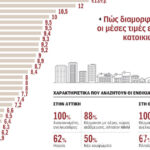Why investing in real estate even in these times is a hedge against inflation
The real estate market and global trends in development real estate as well as the contribution of tourism are at the center of the 24th Prodexpo conference.
In the section on the impact of real estate development as a driving force for the Greek economy, moderated by the CEO of Makt, Maximo Kalatzis, Teresa Messari, CFO/COO of Prodea Investments stated that investment in the real estate industry has, even in these times, a hedge against inflation. Real estate costs are affected by market prices, while vigilance should be exercised to achieve financial cost control, as well as constant investigation of market trends. The key, he said, is as many companies can develop the properties themselves, so they can achieve the best possible returns and rents don’t increase too much. In this context, he emphasized that there is interest in “green” offices, despite telecommuting, in hospitality, logistics and rented accommodation.
Nikos Vettas, general director of IOBE and professor at the Athens University of Economics and Business, said that in the coming years we will systematically experience higher inflation, stressing that there can be no recovery without an increase in housing investment, on the other hand, however, not all real estate investments can be made in the residence. As he noted, the recovery of the real estate market is systematic, however, we have not yet reached pre-crisis levels. “One in four households now pays 40% of their income for housing,” he said, adding that there will be no easy solution to the issue of rising rents. Also, for him, a change in the average size of the residence will be needed in the future, as the number of households without children increases, while he added that there is a stock of old houses that is reaching its limits, as it is not easy to modernize them.
Panagiotis Balomenos, appointed consultant at the Public Real Estate Company (ETAD) praised the important business nature of the State real estate in recent years, with the company keeping its tariffs stable, absorbing inflationary pressures. He gave as an example the Diros Caves, which after a recent upgrade, achieved a 60% increase in traffic, a 50% increase in revenue, but also the Vouliagmeni Coast, with a 5% increase in summer traffic and a 15% increase in revenue. “Faster technical maturity of real estate and well-structured tenders” is the motto of ETAD’s operation in recent months for Mr. Balomones, who revealed that the tender for Vouliagmeni Coast and Oceanida is expected by the end of the year, with the possibility of attracting interest and from abroad, while also four Xenia buildings will be tendered by December 2023.
For his part, the managing director of NOVAL Property, Panagiotis Kapetanakos, emphasized that real estate development companies should pay close attention to their capital structure, as we are going through a difficult economic environment, which will become even more difficult in the near future. The head of AEEAP spoke about the necessity of “green” buildings in order to be accompanied by a reduction in energy costs, while specifically mentioning that new, more environmentally friendly residences should be created. Kapetanakos pointed out that sustainability is now a necessary element in the development of buildings, as the market increasingly promotes the Low Carbon trend, with reduced carbon emissions, referring to the related development of Noval Property on Kifisias Avenue.
With the imminent entry of AEEAP Trade Estates to the Stock Exchange, the managing director of the company Dimitris Papoulis stated that it specializes in the development of commercial parks and omnichannel logistics. According to him, the first sector had not developed at all in the previous years in Greece, while Omnichanel big box logistics serve the needs of large retail players which are becoming bigger and bigger. In relation to the real estate market, Mr. Papoulis stated that the greatest advantage from the point of view of AEEAP lies in the control of management costs, while he added that the issue of high interest rates is a big issue which, however, needs attention in the lending process. In relation to the retail trade, he stated that the competitive prices of the products are “key” for the Greek consumer, as well as the free parking, within a short access radius, of the stores he visits.
The investment grade
The participants analyzed the importance of Greece’s return to investment grade for attracting foreign investment in the real estate market, in a discussion that took place in the context of the 24th Prodexpo conference.
As the general secretary of Public Investments & NSRF, Dimitris Skalkos, pointed out, the investment grade “is important for citizens and households, but also for businesses, because they will have easier access to bank loans, with lower interest rates and therefore will have a strengthened consumer power.” He also emphasized that for the Greek economy it is a “historic window of opportunity, a “game changer”, which changes the rules of the game.”
Mr. Skalkos emphasized the need to continue the path of fiscal caution, while he noted that the government expects in December that Greece will be upgraded to investment grade by the Fitch rating agency.
Regarding the public investment program, Mr. Skalkos emphasized that 100% of the program is now being implemented. “It wasn’t always like that” he underlined, while he mentioned that further strengthening of this program is expected from the plans to deal with natural disasters, it was noted in APE BPE.
Green investments will also be a catalyst, since 27% of the new NSRF and 37% of the Recovery and Resilience Fund will be given for green investments. As Mr. Skalkos pointed out, the effective utilization of European funds can lead to a further upgrade of Greece’s investment rating.
The relationship between investment tier and “bureaucratic tier” was developed by Lambros Belesis, partner at Bernitsas Law, who emphasized the need to improve Greece’s bureaucratic framework.
“The reality of public administration, especially in the real estate service sector, is that there is a huge amount of work, which will increase with the advent of the investment tier. The obvious solution is simplification and more effective digitization” emphasized L. Belesis who also noted that positive steps have been taken in the faster administration of justice, specifically in the Council of State and in the Land Registry, where citizens must also be more diligent and consistent . He added that Greece offers a welcoming and attractive investment environment, with a modern legal framework for establishing businesses and labor relations.
How the improvement of the bureaucracy, and specifically of the Land Registry, will be able to contribute to attracting even more foreign investments, emphasized Olga Eftychidou, head of the legal department of Sioufas and Associates. “We often tell foreign investors to ‘go local’, trying to explain that we have to go to mortgage offices in different areas,” he described. However, as he noted, the investment level as well as the stability that has been cultivated in recent years in Greece have fostered an extremely positive climate not only for institutional investors from abroad, but also for digital nomads, those applying for golden visas and those who want to transfer their tax domicile.
As Ms. Eftychidou noted, approximately 700,000-1,000,000 properties are in the portfolios of red loans and constitute a very large pool of properties that will at some point enter the market and change the image, just as something similar will happen with empty properties. which now remain unused.
“The investment grade means easier investment attraction and a vote of confidence in the Greek economy” noted Nikos Baziotis, cfo/cio of Premia Properties “and attracts strategic and institutional investors. We didn’t have such kind of investors until now” he said and estimated that he will face the increased financier costs, which is the biggest challenge facing the Greek real estate market today.
As N. Baziotis mentioned, the investment grade is a “necessary, but not sufficient” condition, adding that it is still necessary: that the good course of the Greek economy continues, that there is an investment product, that the investment product has characteristics of sustainability and that there is a greater interest in the Greek stock market.




